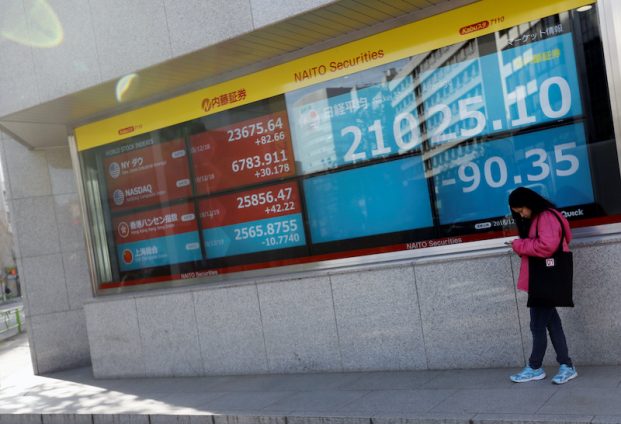Asian trading floors endured a mixed day on Thursday with investors still taking in the news US inflation has yet to peak while the bargain-hunters moved in.
Japanese shares closed higher after Wednesday’s sharp sell-off but mainland China stocks slipped with cautious investors focused on the US Federal Reserve’s interest rate decision next week.
In Tokyo, shares edged ahead as investors bought back equities following Wednesday’s retreat, with travel-related stocks leading the recovery on hopes of a rebound in tourism.
Also on AF: Typhoon Pounds China’s Major Ports as it Heads North
The Nikkei share average edged higher 0.21% to 27,875.91, recovering from its worst session in three months. The broader Topix inched up 0.15% to 1,950.43.
“The market fell too much yesterday,” said Seiichi Suzuki, chief equity market analyst at Tokai Tokyo Research Institute. “But the rebound is small because overnight gains in US equities were limited.”
Airline and railway stocks rose 1.77% and 1.08%, respectively, after a report said Japan was expected to waive visa requirements for certain tourists and remove a limit on daily arrivals in October as it aimed to benefit from a rebound in global tourism.
Property developers, many of which own and operate hotels, gained 1.5%.
But the Japanese yen began slipping again, getting only a limited boost from the strongest hints yet of possible market intervention by Japanese authorities.
China Property Shares Snapped Up
China stocks fell as investors sold new energy shares to snap up property developers on reports of imminent government support, while technology giants and biotech firms lifted Hong Kong equities.
China President Xi Jinping is encouraging local governments to relax homebuying restrictions except the four Tier-1 cities, financial information provider REDD reported.
Guangzhou city allowed property developers to reduce sale prices of homes by as much as 20% compared with 6% previously, the first top-tier cities to do so, Chinese financial news outlet Yicai reported.
China’s blue-chip CSI 300 Index closed 0.9% lower, while the Shanghai Composite Index dipped 1.16%, or 37.62 points, to 3,199.92.
But property stocks led the gains in Hong Kong, with the Hang Seng Mainland Properties Index jumping over 4%, while China’s CSI Real Estate Index rose 3.5%.
The Hang Seng Index gained 0.44%, or 83.28 points, to 18,930.38 and the Hang Seng China Enterprises Index rose 0.6%. The Hang Seng Tech index climbed 0.3%.
The Shenzhen Composite Index on China’s second exchange dropped 2.34%, or 49.11 points, to 2,051.79.
Indonesia Hits Record High
Elsewhere, other Asian markets were mixed, a day after that big sell-off as investors weighed the risk of the Fed announcing a 100-basis-point interest rate increase.
But equities in Indonesia rose 1.3% to a record high. Jakarta shares have jumped nearly 12% so far this year, outperforming all other benchmark share indexes in emerging Asia.
Indian stocks were down though with Mumbai’s signature Nifty 50 index dipping 0.36%, or 65.55 points, at 17,938.20.
Globally, investors were in limbo, with bargain-buying and caution the balancing themes.
“Equity markets are presently in no-man’s land,” said Sean Darby, global equity strategist at Jefferies in Hong Kong.
Fed funds futures, which were dumped along with stocks after Tuesday’s stubbornly hot US inflation reading, imply a 30% chance of a 100-basis-point rate hike next week. They have the benchmark US interest rate as high as 4.3% by February.
Japan’s Yen Eases Against Dollar
In currency markets, the US inflation shock and expectation of rate hikes in response have sent the greenback up to re-test recent multi-decade highs.
The yen, pounded some 20% lower against the dollar this year, eased anew to 143.55 per dollar. It had bounced as far as 142.56 on Wednesday when the Bank of Japan checked dollar/yen rates with banks around the 145 per dollar level – a possible prelude to outright yen buying.
Japan has not intervened in forex markets since 2011 and back then it was to restrain an overly strong yen.
Data out on Thursday showed Japan had posted a record trade deficit in August, one aggravated by the yen’s slide. That was also yet another weight on the currency.
Later in the day European trade data is due and Chinese President Xi Jinping meets Russia’s Vladimir Putin in Uzbekistan.
In oil markets, Brent crude futures dipped 24 cents to $93.86 a barrel.
Key figures
Tokyo – Nikkei 225 > UP 0.2% at 27,875.91 (close)
Hong Kong – Hang Seng Index > UP 0.44% at 18,930.38 (close)
Shanghai – Composite < DOWN 1.2% at 3,199.92 (close)
London – FTSE 100 > UP 0.5% at 7,312.77 (0935 BST)
New York – Dow > UP 0.1% at 31,135.09 (Wednesday close)
- Reuters with additional editing by Sean O’Meara























